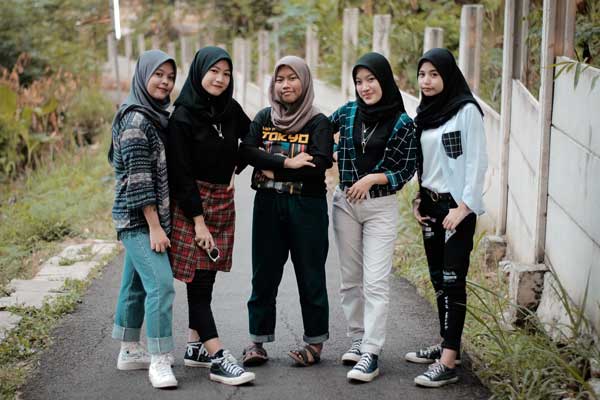Jane Austen, the 18th century English novelist, the literary queen of love and marriage, once wrote, “Friendship is certainly the finest balm for the pangs of disappointed love.” Most of her books are centered on the idea that friendships help young women go through the ups and downs of courtship, and all the books feature strong female friendships. Pairs like Elizabeth Bennet and Charlotte Collins show us that friends remain crucial to our well-being no matter what our relationship status may be. In reflecting on my own journey to find love and marriage, I’ve come to realize how significant a role my friends play in my life.
While I enjoy reading about the dynamics of 18th century friendships in the Austen novels, the lessons learned pale in comparison to the teachings of friendship seen in the Islamic tradition. So, it led me to ponder in what ways Muslims have been taught the value of friendship.
Prophet Muhammad’s Friendship with Abu Bakr
Our beloved Prophet Muhammad (s) serves as the ultimate exemplar of what it means to be a good friend, and how we can cultivate relationships in pursuit of Allah’s love. The Prophet’s most notable friendship was with Abu Bakr, also known as as-siddeeq (the truthful). Abu Bakr was one of the first in the Prophet’s circle of family and friends to become Muslim. He remained by the Prophet’s side, helping to spread Islam and defending the Prophet through the most painful days of persecution.
In describing his love for Abu Bakr, the Prophet (s) said, “If I had taken anyone as my khaleel [closest friend], I would have taken Abu Bakr, but he is my brother and companion” (Bukhari and Muslim). Scholars say that by using the word “khaleel,” the Prophet was expressing how deeply he cared for his brother in Islam, and if his love of Allah SWT wasn’t already the biggest occupant in his heart, he would have named Abu Bakr as the human that filled that space, as someone he valued most in dunya.
On both sides of my family, relatives are of another faith, or no faith at all, therefore leaving me to search for more God-centered relationships in my community. In having found those souls who help me keep the remembrance of Allah foremost in my mind and heart, I have realized that the right type of friendship can fill voids and fulfill us in the most profound ways.
Good Companionship Preserves and Increases Faith
The Prophet (s) was reportedly asked, “Which of our companions are best?” He replied, “One whose appearance reminds you of God, and whose speech increases you in knowledge, and whose actions remind you of the hereafter” (Al-Muhasibi). The men and women that surrounded the Prophet (s) were some of the best exemplars of what it means to be a good Muslim, those who fulfill the role of best companions as described by the Prophet. After individuals like Abu Bakr entered the fold of Islam, they became examples of those who cultivate good character, those who are fair in their business dealings, gentle in their manner of speech, and whose every word and action was striving to please Allah SWT. These companions were noble, not by way of their lineage, but in the way they worshipped Allah, lived their daily lives, and interacted with others.
We are the taught names and stories of the companions like Umar ibn Al-Khattab, Uthman ibn Affan, Ali ibn Abi Talib, and Sa’id ibn Zayd. They were not spontaneously perfect, they practiced Islam, they always were looking to reform themselves and increase their faith and good character. We learn about the times when the Prophet (s) had to correct this or that companion for their anger or their jealously, or some transgression. But this alerts us to the fact that each of us is a “work in progress,” that we can always better ourselves. The stories of the companions show us about our capacity to improve but also about the exemplary ability to uplift and care for one another. For what is the point of aiming for excellence if we do not extend it to uplift and care of others?
Loving Others for the Sake of Allah SWT
Reflecting on some of my closest friendships, I see qualities of a relationship that exemplifies loving each other for the sake of Allah. During financial difficulties or emotional hailstorms, my close friends have served as answers to my duas. Their kindness and generosity are a testament to the mercy that Allah extends to us when He puts certain people in our lives. During times of ease or difficulty, we fulfill our obligations to each other as fellow Muslims and Muslimahs, and simply as good humans.
And we should never forget to let the people we love for the sake of Allah SWT know that we love them. We find in a narration that a man was with the Prophet (s) when another man passed by and the former said, “O Messenger of Allah, I love this man.” The Messenger of Allah asked, “Have you informed him?” He said, “No.” The Messenger of Allah then said, “Tell him [that you love him].” So, he went up to the man and said to him, “I love you for the sake of Allah,” and the other replied, “May Allah, for whose sake you love me, love you” (Abu Dawud).
In fact, when we love another person for the sake of Allah, we earn Allah’s love. The Prophet (s) has told us, “A man set out to visit a brother [in faith] in another town and Allah sent an angel [to meet him] on his way. When the man met the angel, the latter asked him, ‘Where do you intend to go?’ He said, ‘I intend to visit my brother in this town.’ The angel said, ‘Have you done any favor for him?’ He said, ‘No, I have no desire except to visit him because I love him for the sake of Allah, the Exalted, and Glorious.’ Thereupon the angel said, ‘I am a messenger to you from Allah: that Allah loves you as you love him [your brother in faith]’” (Muslim).
Not only do we receive the blessing of Allah’s love when we love others for His sake, we also are rewarded with the best protection and refuge on the day that matter’s most. The Prophet (s) said, “On the Day of Resurrection, Allah, the Exalted, will say, ‘Where are those who have mutual love for the sake of My Glory? Today I shall shelter them in My shade when there will be no shade except Mine’” (Muslim).
The bonds of friendship are gifts. Caring and uplifting are gifts of the heart and soul. These, when rooted down, deep, into the rich, fertile ground of faith, are expressions of the love of Allah SWT, loving for the sake of Him. Here, there is true power.






